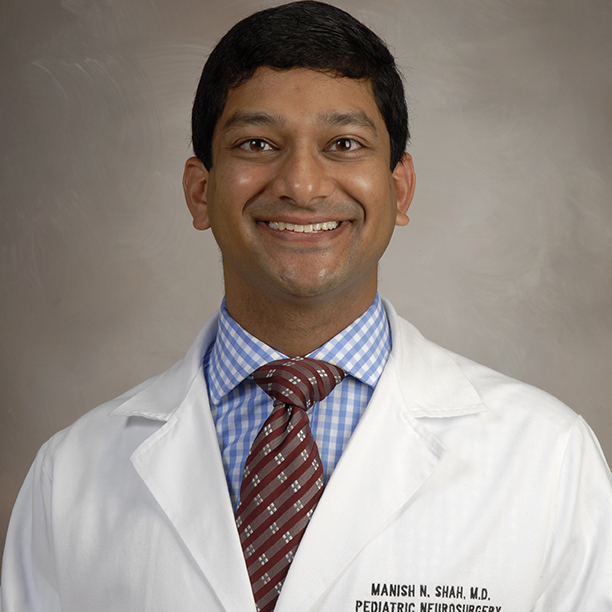Surgeon Manish Shah ’02 Serves Children in Need on Trips to Haiti
In the U.S., hydrocephalus is most often seen in premature babies who are typically treated and cured soon after diagnosis. But in Haiti, the condition, which can also be caused by meningitis, poor prenatal care, and infectious diseases, leaves children languishing for years with enlarged heads and small, malnourished bodies as their skulls grow to accommodate the fluid, Shah says. The goal of the medical missions and Project Medishare, the Miami-based organization that facilitates the trip, is to treat as many affected children as possible before they get to this potentially fatal stage.
Preparations for the trip begin a year in advance, according to Shah, because he and the other physicians and operating staff members associated with McGovern who travel together must transport endoscopic technology, as well as every suture, surgical cap, and shoe cover because of the limited resources in Haiti.
Shah’s first trip was in 2011, just over a year after the earthquake that devastated Haiti in 2010. “In the beginning we would bring our camping headlamps because the lights would go out every few hours,” he recalls. “But what’s remarkable is the people of Haiti have worked really hard and [the power] has been very reliable on the last couple of trips.” However, Shah learned the hard way that the country’s recovery is a work-in-progress. The power went out again on a recent trip, and because he had stopped bringing headlamps, he had to perform a procedure under the light of an iPhone.
On their first day in Haiti, the physicians evaluate children who have been pre-screened by a Project Medishare nurse who works year-round to identify candidates. Four surgeons then perform about 25 surgeries over the next three days. By comparison, a typical pediatric neurosurgeon in the U.S. does 3 or 4 surgeries in a week, according to Shah.
“We work hard to safely and efficiently help as many children as possible. It’s a testament to how amazing the entire team of staff, nurses, anesthesiologists and surgeons is,” Shah says. The team also has been collaborating to identify and train a Haitian neurosurgeon to treat hydrocephalus.
Shah also brought a pioneering procedure to the Houston area — the treatment of spastic diplegia, a form of cerebral palsy, with selective dorsal rhizotomy, a surgery performed on the lower spinal cord to improve muscle control. He learned the procedure at Washington University from one its innovators, Dr. Tae Sung Park.
Shah also treats pediatric epilepsy and performs procedures that have enabled his patients to live free of seizures. He credits Princeton professors and the rowing team with helping him develop the perseverance needed to accomplish his goals.
“I learned a lot about resilience both during victory and defeat from four years on the rowing team, especially from coach Joe Murtaugh,” Shah says. “In the fall of 2000, the first junior paper I wrote in the physics department was with Professors Vipul Periwal and Curtis Callan investigating the newly sequenced yeast genome. We used statistical methods to learn how the DNA sequence was structured in an automated fashion similar to how a child learns language. … It is the basis of how my laboratory plans to reclassify and better select children for epilepsy and cerebral palsy surgery to have the best outcomes.”












No responses yet